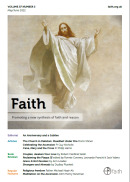An Anglican feminist on Mary
Review by Pia Matthews
Grace Is Not Faceless, Reflections on Mary is a collection of the writings of Ann Loades, an influential feminist thinker from the Anglican tradition. The collection includes essays on Mary as she is treated in ecumenical dialogue, notably the Anglican-Roman Catholic International Commission (ARCIC) discussions and the debate over the doctrines of the Immaculate Conception and the Assumption, reflection on poetry and the Nativity, a short meditation on the Royal Mail’s Christmas stamps of 2019, and two sermons one on the Annunciation the other on the Assumption.
The overall theme of the collection follows Loades’s own stated project: that her general aim is to give an account of the enterprise of feminist theology and then reflect on how Mary is viewed by a variety of feminist theologians from different faith traditions. The main thrust of this collection is to present a feminist critique of these different traditions. After all, according to Loades, Mary seen through a feminist lens can be helpful for ecumenism. Nevertheless, her principal complaint is that in Marian theology in general, and specifically in the ARCIC enterprise, feminism is not taken into account.
The female face of grace
Loades does offer the main aspects of Roman Catholic and Anglican thinking on Mary. However, the reader will not find a detailed account of Marian theology from either of these two traditions in this book nor how there is or could be dialogue on Mary between the traditions. Indeed, the editor Stephen Burns takes it upon himself to at least outline themes from Scripture, Catholicism, Anglicanism, and theological ‘other voices’ in his introduction in order to give the reader some orientation. The title of the book is taken from a phrase coined by the Dominican Cornelius Ernst to describe the significant presence of Mary in the Catholic experience. For Loades the phrase ‘grace is not faceless’ means that the face can be female as well as male.
Oppressive, idealized or sentimentalized?
Loades claims that traditional doctrines about Mary are constantly assessed by women as suggesting the denigration of all other women, be they doctrines about Mary in contrast to Eve, Mary as the most blessed among women or that in the Incarnation God ‘did not abhor a virgin’s womb.’ According to Loades, in these doctrines it is women’s bodies not men’s bodies that are treated as in some way sinful, problematic, ‘indecent’. Loades also thinks that Vatican II documents referring to Mary are not ‘untypical of Christian attitudes to women’: they ‘cut Mary down to size’. It seems that male theologians, especially Catholic theologians, cannot put a foot right, even when they seek, like Pope St Paul VI and Pope St John Paul II, to emphasize the equal dignity of women. Loades continuously sees in most pronouncements gender stereotyping and a pervasive gap between the ‘proclamation’ of ‘full personhood’ for women, represented by the ‘new Eve-Mary,’ and the ‘practice’ of associating women with the ‘old Eve.’ Instead of what she regards as these oppressive or idealized or sentimentalized images of Mary, Loades engages with other feminist thinkers who believe that Mary can mobilize us for change and alert us to oppressions.
Sticking points
The collection as a whole may seem rather repetitive, and this is understandable given that it is made up of some of Loades’s important contributions to feminist Marian approaches. Loades highlights some of the sticking points for Mary in ecumenism such as the concerns over the way in which a focus on Mary may detract from the work of Christ, the nagging worry of reformers of potential idolatry or superstition, and she notes that the Anglican tradition is more nuanced when it comes to, for instance, liturgies. Her sermon on the Assumption roots the feast in early Christianity and she points out that Mary, ‘no door-mat,’ is the only person in Scripture ‘twice Spirit-graced,’ in the Annunciation and at Pentecost. However, these sticking points are essentially observations on which she layers her conviction that ‘Christian theological feminism simply has not been taken into the theological bloodstream of those likely to produce an acceptably ecumenical statement’.
Mary and ‘co-inherence’
Loades does remind the reader of the need to pay attention to historical realities whether it is the recollection of Mary as an historical person or the actual experiences of women and men. Loades also expresses the hope of feminist theologians that they can ‘verbalise God’ in an inclusively human manner, taking account of female human beings. Along with other feminists, she thinks that a new inclusive vision should apply to biblical texts, exegesis habits, ecclesiastical practice and tradition. Moreover, she claims that the ‘symbol of Mary’ can help us to achieve in both Church and society a new sense of ‘co-inherence’ between men and women so that ‘each actualizes the dignity and worth of the other’.
‘A horizon of hope’
Loades’s previously unpublished essay ‘Mary for Now’ is perhaps the most significant contribution in the collection. To begin with Loades once again reminds the reader that, in spite of ‘ambivalence’ in the complex Christian tradition, this tradition can still offer ‘a horizon of hope’ for all, both ‘within and beyond Christian institutions’. Then using insights from, among others, Evelyn Underhill and Dorothy L. Sayers, Loades highlights the way in which Mary can stand for the ‘unbelongers’ who bring about change notably through prayer and pacifism, and Mary’s role in the tradition as protector, defender and lady wisdom.
However, in a significant addition, Loades introduces the offering of Karen O’Donnell on how Mary’s experiences of flight into exile to avoid massacre all the way up to the images of the Stabat Mater and the Pieta can inform the new field of trauma theology. Given the real problem of violence against women, as well as the often understated tragedy of miscarriage, the significance of Mary in trauma theology based on the reality of embodied experience can be a new and fruitful area where feminist theology can bring real insights.






